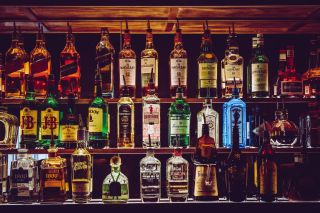Alcoholism
Depression, Anxiety, and Binge Drinking
The effects of self-medicating with alcohol.
Posted February 10, 2023 Reviewed by Ekua Hagan
Key points
- Depression increases the risk of binge drinking.
- Anxiety decreases the risk of binge drinking.
- Self-medicating with alcohol is not effective, and can actually amplify mental health problems.

Alcohol is used as an escape. We might unwind with a drink after a stressful day at work, let loose with a couple of drinks at the bar, and start the party with the same.
But when does a “drink or two” turn into a bigger problem?
What Is Self-Medicating?
Sometimes, we attempt to use alcohol as an escape when we truly need professional support. This often leads to self-medication.
Self-medicating is using alcohol or other substances to cope with internalized feelings like anxiety and depression. We keep these emotions inside, not knowing quite how to manage them. Alcohol can offer a temporary escape from these painful emotions. But often, it does more harm than good — especially in the case of binge drinking.
What Is Binge Drinking?
Binge drinking (also known as heavy episodic drinking) is a type of alcohol misuse where an individual drinks an excessive amount on one occasion. This is typically measured as five or more drinks for men and four or more drinks for women. As of 2021, 15.6 percent of Canadians were considered “heavy alcohol drinkers,” meaning they practiced binge drinking at least once per month over the past year.
The Link Between Binge Drinking, Anxiety, and Depression
How does binge drinking affect those using alcohol to self-medicate and relieve symptoms of anxiety and depression? In our research, my colleagues and I committed to answering this question to provide more support for those struggling.
After analyzing the relationship between binge drinking, anxiety, and depression over six months, here’s what we found:
- Increased Depression = Increased Binge Drinking: Depressive symptoms were linked with an increase in binge drinking. Our research found that depression is significantly linked to binge drinking. Many individuals might turn to alcohol to escape feelings of loneliness and hopelessness.
- Anxiety Decreased Likelihood of Binge Drinking: In contrast, anxiety was negatively associated with binge drinking. In short: The more anxious an individual is, the less likely they are to binge drink. This is likely due to common experiences like “hangxiety,” sensitivity to panic symptoms, and discomfort around a lack of control.
The Danger of Alcohol and Self-Medicating for Depression
While binge drinking may provide a temporary escape from depressive symptoms, it does not offer any real, lasting relief. Alcohol is not a medication. It’s not meant to treat or relieve depression. It does not solve mental health issues—too often, it causes them. Binge drinking can lead to alcoholism and prevent an individual from seeking solutions that can provide deeper, lasting relief.
Get the Lasting Support and Relief You Need
There is hope. There is healing. There is help. Alcoholism, depression, and anxiety can all make you feel like you’re drowning. It can be overwhelming to deal with mental health, and alcohol can seem like an easily accessible escape, but there is relief and recovery beyond the short-term effects of alcohol. Therapy can help individuals struggling with depression, anxiety, binge drinking, and alcohol misuse.


